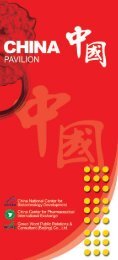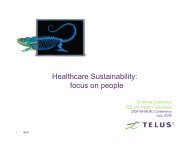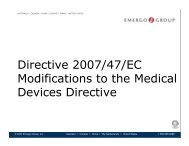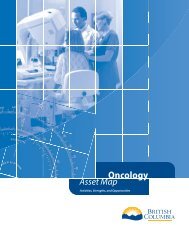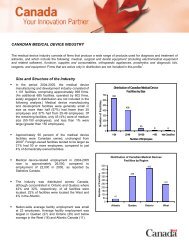Report - LifeSciences BC
Report - LifeSciences BC
Report - LifeSciences BC
- No tags were found...
Create successful ePaper yourself
Turn your PDF publications into a flip-book with our unique Google optimized e-Paper software.
was understood that the cost of theseservices were offset by generic rebates andother indirect sources of revenue. In effect,the rebates provided by the generic industryto pharmacy have subsidized the provisionof services provided to patients bypharmacy; and2. If the reimbursement arrangement forgeneric drugs is to be substantially altered,either through negotiation or throughlegislation, it will be essential for the PSD tonegotiate a new arrangement with pharmacyto ensure that high quality patient servicesare sustained and, where possible, improvedwhile also ensuring that the compensationfor pharmacy in respect of the provision ofthese services is reasonable and fair.The Task Force is not indicating that the costof prescriptions should be $13.60 pertransaction. Clearly some adjustment ought tobe put in place but the level should bedetermined through negotiations between theparties. These negotiations should also addressthe scope of, and compensation for, professionalcounseling and other services provided bypharmacy in addition to the dispensing fee. TheJanuary 2007 Activity Based Costing Studyprovides a useful foundation for thecommencement of those discussions.More Direct Engagement with InnovativeDrug ManufacturersAs noted earlier, (see p. 5 above), the PSDhas indicated that one element of theirproposed cost containment initiativecontemplates more direct engagement withmanufacturers to secure product agreementswith “better terms.” The Task Force believesthis proposed approach has considerablepotential but that the PSD would be mostsuccessful if their concept of “better terms”extends beyond economic arrangements to theshared interest that the PSD and industry have,or ought to have, in substantially improvinghealth outcomes for patients.The Task Force heard that innovative drugmanufacturers have developed, or have beeninvolved with, a number of diseasemanagement initiatives in other jurisdictions.From their perspective, improved engagementand a clear and stable operating environmentwould help to create the conditions necessaryfor industry to deploy similar programs inBritish Columbia in partnership with otherhealth care providers. In fact, <strong>BC</strong>'s uniquenessas a platform for improved evidenced-basedpopulation health outcomes is considered byindustry to be a very valuable asset. The TaskForce believes that the province and industryhave much to gain by working more closelytogether to make full and effective use of theresources available to them.If the right conditions for effectiveengagement are to be established, it willremain essential for industry to understand thatthe Province's interest in the containment ofpharmaceutical costs is pressing and substantial.All parties, including the manufacturers ofinnovative drug products, must be prepared toaccept new approaches to shared risk. TheTHE REPORT OF PHARMACEUTICAL POLICY RECOMMENDATIONS FOR THE MINISTRY OF HEALTH 20 APRIL, 2008





